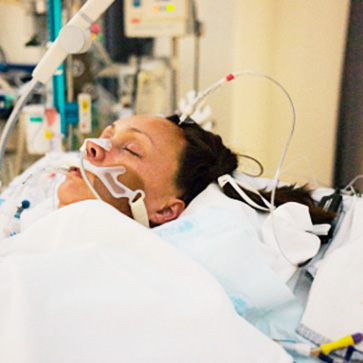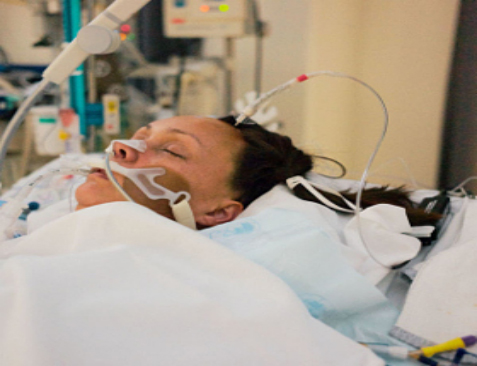Podcast: Play in new window | Download
Subscribe: Apple Podcasts | RSS
Hi, it’s Patrik Hutzel from INTENSIVECAREHOTLINE.COM where we instantly improve the lives for Families of critically ill Patients in Intensive Care, so that you can make informed decisions, have PEACE OF MIND, real power, real control and so that you can influence decision making fast, even if you’re not a doctor or a nurse in Intensive Care!
This is another episode of “YOUR QUESTIONS ANSWERED” and in last week’s episode I answered another question from our readers and the question was
You can check out last week’s question by clicking on the link here.
In this week’s episode of “YOUR QUESTIONS ANSWERED” I want to answer questions from one of my clients Stephanie as part of my 1:1 consulting and advocacy service! Stephanie’s mother is in Post- Cardiac Arrest care in ICU and she is asking if the family meeting with the ICU doctors are a good avenue to get their message across.
My Mother is in ICU for post- Cardiac Arrest Care, Is this a lifetime impairment or disability?

Miranda: Mr. Patrik can I ask you some more questions?
Patrik: Please.
Miranda: Is there any way that- I’m sorry.
Stephanie: Go ahead.
Miranda: Is there any way you gonna be at the hospital? Is there any one that is on the family’s side?
Recommended:
Patrik: Um, it’s hard to look, you would have seen within those nine days, you probably would have seen some change in doctors in terms of, you know, maybe one doctor is in charge for a few days, then they change their rosters and then they-
Tonette: Right.
Patrik: You would have seen some of that.
Stephanie: We did.
Tonette: I have.
Patrik: Look, there could well be a change in attitude from doctor to doctor. Most of the time they are speaking with one voice, most of the time.
But not all the time, and you will find that some doctors take a different approach to others. What’s sometimes- do you feel, at the moment, do you feel like the neurologist and the ICU doctors are speaking with one voice?
Tonette: Yes, in a sense, when the round up. Because they go outside the room and they round up and they be talking. I gotta get this one doctor, he’s really good. Yeah. They all met, they all take notes, everybody had their doctors on them talking to nurses, doctors on down. And they say what their findings are.
Patrik: Right, right, okay.
Stephanie: And they do that in front of the family. The family’s allowed to come, but see they think that you don’t know what they’re talking about, and I’m taking notes while their talking. And when I say that, I start asking questions, guess what they ask me, Patrik. They say, “Are you medical?” I’m like, “No.”
Tonette: That’s what they said, Stephanie.
Stephanie: I’m like, “No. I guess I’m just concerned.” And how do they work? What work that you do? You know, it’s not even about that. You know what I mean? It has nothing to do with that, if you just need to, you know, I will say this, the one doctor, the senior doctor that’s working with her now, Dr. Philipps I think he is the one that’s doing more pushing than anything. We had an Indian doctor who was the senior doctor at that point.
Now, Dr. Philipps is a man. He was the senior doctor in ICU because he was the attending. Now what does that mean? Is there anybody higher than the attending doctor? Because to me attending is not the same.
Tonette: Right.
Patrik: No, yeah, yeah, yeah, yeah. Look I wouldn’t too much about that sort of stuff. It’s just intimidation tactics from them, you know, I wouldn’t worry too much about that. It’s just some people, some things you just better ignore. If he, if somebody asks, “Oh, are you medical?” You know, your response should probably be something along the lines of, “Look, I may not be a doctor or a nurse, but I’m making inquiries and I’m doing my research, so what’s, you know,” Your response needs to be, “What’s your problem with me asking questions? Do you have anything to hide? Do you have anything-?
Recommended:
Stephanie: That’s right. That’s what I told them.
Patrik: Right. Right.
Stephanie: One time, well I said, “Well I do research.” I told them, I said “I do research.” You know, and I said “I’ve been in this environment quite a bit, you know, with my mom and so forth.” And, yeah, that’s exactly my response is on those lines.
Patrik: You know, what’s their problem with being open and transparent and answering questions? What’s their problem with that?
Stephanie: Mm-hmm (affirmative)-what difference does it make what I do?
Patrik: That’s right, that’s exactly right, you know.
Miranda: Is Tonette still on here?
Tonette: Yes.
Stephanie: But I did tell them-
Go Ahead, Miranda
Miranda: Tonette did you have any questions?
Tonette: No.
Stephanie: Anybody else before we go?
Miranda: George?
Stephanie: Did he drop off the call?
Tonette: Maybe so.
Stephanie: George are you there? I know it’s late. George are you there? It’s okay.
Tonette: It’s alright you had a long day at work.
Stephanie: So doctor, I’m sorry Patrik, I don’t mean to say doctor or nurse, you know, Patrik, we really, really, really appreciate the insight that you have given us, and you’ve given us what we need to try to go forward. You will be in our back pocket. I’m sure this is not going to be last you gonna hear of us. Anything else anybody would like to say? In conclusion?
Recommended:
Tonette: No, I think you pretty much covered everything, but I just wanted before we close out, what Nurse Patrik said, like today, when I went out to here to get the feedback. I was standing in front of Carmen’s door, and one doctor said, “Come over here, move over here, away from them.” I said, “excuse me?” I said, “I’m standing right here in front of the door.” Like I was offence- and he was over there saying, like, I didn’t feed into it, but the thing of it was very negative response. But I was standing where I needed to be standing so I could hear the conversation about-
Stephanie: And I walked right into the middle of them. And me, I walked right into the middle of them. I stood there like I belonged there.
Patrik: Good, good. I like that. I like that. I have a couple of articles on my website where I talk about how to use your body language to your advantage in a situation like that. It’s critical. It’s absolutely critical that your body language displays to them that you are not intimidated by anything. I like when you saying that you stood there as if you owned the place. I like that. That’s very important.
What I’ve observed over the years is that most people are, they, everybody can see with their body language the minute they go into an ICU that they’re intimidated, that they’re negative. Your body language, the way you make eye contact with them, you know, it’s going to be critical. Your tone of voice, it’s going to be absolutely critical.
Stephanie: Mm-hmm (affirmative)-
Tonette: Mm-hmm (affirmative) I did that with Dr. Reynolds today. I gave him eye to eye contact and I didn’t even flinch. Oh, I gave it to him. I can put it on him. Yes I did.
Stephanie: The other thing is-
Recommended:
Patrik: Very important.
Stephanie: Mm-hmm (affirmative). And the other thing is, at least two or three people asked me, if Carmen was my mother, you know, because I’m medical, or did I, what did I do, when I was standing there before him, I’m not saying this for recognition or anything, but I’m just trying to let you know, to let them know that, when they were explaining various things, they could not believe that I understood what they were talking about because they were saying words I was using verbal, I would use gestures, to show them that I knew that they were referring to the heart, and I would point to the head, and would make sure, you know, I’m listening carefully, I’m looking this way, I’m looking that way, like I actually could hear them. You know, and so, they know that I’m a part of that team, too. You know what I mean?
Patrik: Yeah, yeah, yeah, yeah yeah.
Stephanie: And Miranda as well.
Tonette: Yeah.
Patrik: The way you’re interacting with them is going to be critically important. You know, my advice only works if you’re implementing and if you’re not intimidated. You know, we can talk about strategies for hours, you need to implement, you know and you need to use what you know now to your advantage.
You know, sometimes I work with clients, I know they are too timid to walk the talk. I can see that you’re not, right, and that’s good. That’s all it often takes. Not giving up and not taking no for an answer, and calling them out on, you know, their bullshit, really, because you know, LTAC is not going to work. It’s not working for most people. As I said, there may be a few LTACs in between who are good. I haven’t come across them.
We are seeing the worst, don’t get me wrong. People come to us when they’re at their worst, don’t get me wrong, you know. So maybe there are people in LTACs that track fine because they don’t come to us, but my experience, clearly is it’s not working for people.
Recommended:
- YOU DON’T KNOW WHAT YOU DON’T KNOW WHEN YOUR LOVED ONE IS CRITICALLY ILL IN INTENSIVE CARE! (PART 1)
- YOU DON’T KNOW WHAT YOU DON’T KNOW WHEN YOUR LOVED ONE IS CRITICALLY ILL IN INTENSIVE CARE! (PART 2)
Stephanie: Mm-hmm (affirmative), right.
Miranda: I know something that we need to take in that we didn’t mention it all was in reference to her blood count going down.
Stephanie: Oh did you really? I think I talked to him about that too, Miranda. I think I talked to him about her blood count going down because, you don’t remember them saying that when they do CPR there was bruising internally. The right pectoral because they do the CPR, and that could have caused the bleeding.
Patrik: Do you know-
Stephanie: But it’s under control.
Patrik: Do you know what her blood cell count is? Do you know the haemoglobin?
Miranda: Not at this, right at the moment. Last time they told me-
Stephanie: The last time that I was there, I know her blood, her haematocrit. I don’t know about the haemoglobin. The hematocrit will tell you what’s going on with the haemoglobin.
Patrik: Yes.
Stephanie: And her hematocrit was twelve, and it dropped down to seven, but it dropped down to that, but it was over a period, I think that they said that, that when she came in it was low, right Miranda?
Miranda: Three days, I think. We found out-
Stephanie: It was over a period of three days, yes. Over a period of three days, her haemoglobin went down, so what are you thinking, Patrik?
Patrik: Have they given her a blood transfusion?
Stephanie: That was before, that was before the blood transfusion.
Tonette: Yeah, she had two.
Miranda: As far as I know.
Recommended:
Stephanie: And now it went back up to eight. But I don’t know, the last I heard.
Patrik: Mm-hmm (affirmative)-
Stephanie: Are they still giving her blood today, Miranda?
Miranda: I don’t know about that, today, I don’t think anybody was like, following it up like that.
Stephanie: Yes.
Patrik: Okay.
Stephanie: You would see it, if they hung the blood.
Miranda: I don’t- there’s a possibility they gave her one because, her urine bag had some blood in it. And I said something to them-
Stephanie: What did you say again? Say again, Miranda.
Miranda: Her urine bag had some blood in it, and I was talking to the guy, he was like not even worried about it, really, and I was like, “You need to report it to the doctors.” He was like-
Tonette: You’re talking about Bill, right?
Miranda: No.
Patrik: She would have been, she would have been on some blood thinners after the cardiac arrest.
Miranda: He said blood thinners, what you saying.
Recommended:
Patrik: Yeah. She would have been on some blood thinners that potentially caused some bleeding which probably dropped the hematocrit, probably dropped the haemoglobin, which is why she ended up with some blood transfusions.
You know, again, in a situation like that, we’ve talked about the main issues. We haven’t even scratched what’s under the surface and that would include things like, you know, potentially haemoglobin, why is it low. Probably we haven’t even touched on kidney function, because they are, they all could be potential issues in a situation like that.
You’ve touched briefly on liver function. You know, we haven’t even talked about, you know, how impactful was the cardiac arrest on her heart going forward? You know, we haven’t even talked about that. And it’s not, I don’t think it’s a priority at the moment, but, you know, the devil in a situation like that, is definitely in the detail.
But, at the moment, the bigger picture is way more important.
Tonette: Absolutely.
Stephanie: They did say that her vital organs were working, though. They said her kidney was flushing well. Now the one time, when they tried to do her blood up, they were giving her PPF, that’s what they give up, and they were also giving her iron. And iron will change the colour of the urine along with perhaps some other stuff, I don’t know what they were giving her. That’s like what Miranda said, it could also have been some blood in her urine or what have you. We don’t know.
Patrik: Yup, yup, yup. But I think working on the bigger picture is way more important at the moment.
Stephanie: It is.
Tonette: Mm-hmm (affirmative)-
Patrik: Way more important.
Recommended:
Stephanie: It’s good to know, it’s good to know all the details, and some of the details too.
Patrik: Yeah, absolutely.
Stephanie: Did that answer your question, Miranda?
Miranda: In reference to what? All the stuff that we- yeah, yeah, that’s what the nurse said. He said, blood transfusion and what’s that thing? Blood thinner. So he wasn’t really worried about it.
Tonette: What is her blood type?
Miranda: I don’t know her blood type.
Tonette: I asked and he never told me.
Rebecca: I think it’s O.
Tonette: Okay, well that’s good then. If it’s O, that’s good.
Patrik: Okay, any other questions?
Stephanie: No, if you can send me that information between today and tomorrow. Tomorrow’s fine.
Patrik: Yeah, yeah, yeah. I will send you definitely more information, absolutely.
Stephanie: Now, is the information, I’m still here at work, so are you gonna send the information-
Patrik: I will send you- for me at the moment it’s three pm.
Stephanie: Oh my gosh.
Patrik: I will send you the information- for you at the moment it’s one am, isn’t it.
Recommended:
Stephanie: Yes, but you can send it to my home. If you send it to Claire and Amy I will get it. I will get it, and I won’t come into work again until 2:30, so that will be after the meeting tomorrow, at the hospital, so-
Patrik: I will definitely send it to you before, you will have it before eight or nine am your time.
Stephanie: Awesome, awesome. –
Tonette: Wonderful.
Patrik: Yup.
Stephanie: Thank you so much and we will be in touch, I’m not going to keep you-
Miranda: But, one second, one second, ideally you’re saying if they are not even giving us an agenda then we’re not going to participate in the meeting.
Patrik: Say that again please?
Miranda: Oh, she was saying that-
Stephanie: She says, ideally, then, you’re saying that if they’re not willing to give us an agenda, then we’re not going to participate in the meeting.
Patrik: Yeah, I wouldn’t worry too much about that. If they can’t give you an agenda for the meeting, then you know that the agenda’s a big secret. What’s the problem with writing an agenda? What’s the problem around that? I mean what do they have to hide?
Recommended:
Stephanie: I feel like this. If they don’t give us an agenda, we will go into the meeting, and we will sit there and let them know what our goal is. You know, what is your goal towards Carmen? And if they don’t, if their goal is not our goal, then we consider this meeting adjourned.
Patrik: Exactly, exactly. Look, it’s a very good mindset to have that you are making your rules. It’s a critical mindset to have that you are making your rules. You can’t be intimidated. You’ve seen some of the games they’re playing already, you know, and you’re not playing them.
Stephanie: Right, exactly. He’s like, he said, oh, you’re an MBA? I said those are just letters behind my name. That’s not who I am.
Patrik: Absolutely, absolutely. I’ve got to go, sorry.
Stephanie: No, no, no, you’ve been absolutely, you’ve gone over and above the call of duty. And you know, like I said, we will be talking to you again. I know you’ve gone over and above. But I really appreciate you speaking to my family. I’ve spoken with you before now, but I can’t tell you how much we appreciate. Are we all of one accord that we appreciate this meeting.
Rebecca: We deeply appreciate you. Yes.
Patrik: You’re very welcome. You’re very welcome. It’s been a pleasure. It’s been a pleasure. Stephanie. I will email you more information before nine o’clock tomorrow morning.
Stephanie: Wonderful. Take care and good night.
Recommended:
Patrik: Okay, have a good night. Thank you so much. All the best. Bye-bye.
The 1:1 consulting session will continue in next week’s episode.
How can you become the best advocate for your critically ill loved one, make informed decisions, get peace of mind, control, power and influence quickly, whilst your loved one is critically ill in Intensive Care?
You get to that all important feeling of making informed decisions, get PEACE OF MIND, CONTROL, POWER AND INFLUENCE when you download your FREE “INSTANT IMPACT” report NOW by entering your email below!
In Your FREE “INSTANT IMPACT” report you’ll learn quickly how to make informed decisions, get PEACE OF MIND, real power and real control and how you can influence decision making fast, whilst your loved one is critically ill in Intensive Care! Your FREE “INSTANT IMPACT” Report gives you in-depth insight that you must know whilst your loved one is critically ill or is even dying in Intensive Care!
Sign up and download your FREE “INSTANT IMPACT” REPORT now by entering your email below! In your FREE “INSTANT IMPACT” REPORT you’ll learn how to speak the “secret” Intensive Care language so that the doctors and the nurses know straight away that you are an insider and that you know and understand what’s really happening in Intensive Care! In your FREE report you’ll also discover
- How to ask the doctors and the nurses the right questions
- Discover the many competing interests in Intensive Care and how your critically ill loved one’s treatment may depend on those competing interests
- How to eliminate fear, frustration, stress, struggle and vulnerability even if your loved one is dying
- 5 mind blowing tips & strategies helping you to get on the right path to making informed decisions, get PEACE OF MIND, control, power and influence in your situation
- You’ll get real world examples that you can easily adapt to your and your critically ill loved one’s situation
- How to stop being intimidated by the Intensive Care team and how you will be seen as equals
- You’ll get crucial ‘behind the scenes’ insight so that you know and understand what is really happening in Intensive Care
- How you need to manage doctors and nurses in Intensive Care (it’s not what you think)
Thank you for tuning into this week’s YOUR QUESTIONS ANSWERED episode and I’ll see you again in another update next week!
Make sure you also check out our “blog” section for more tips and strategies or send me an email to [email protected] with your questions!
Also, have a look at our membership site INTENSIVECARESUPPORT.ORG for families of critically ill Patients in Intensive Care here.
Or you can call us! Find phone numbers on our contact tab.
Also check out our Ebook section where you get more Ebooks, Videos and Audio recordings and where you can also get 1:1 counselling/consulting with me via Skype, over the phone or via email by clicking on the products tab!
This is Patrik Hutzel from INTENSIVECAREHOTLINE.COM and I’ll see you again next week with another update!







